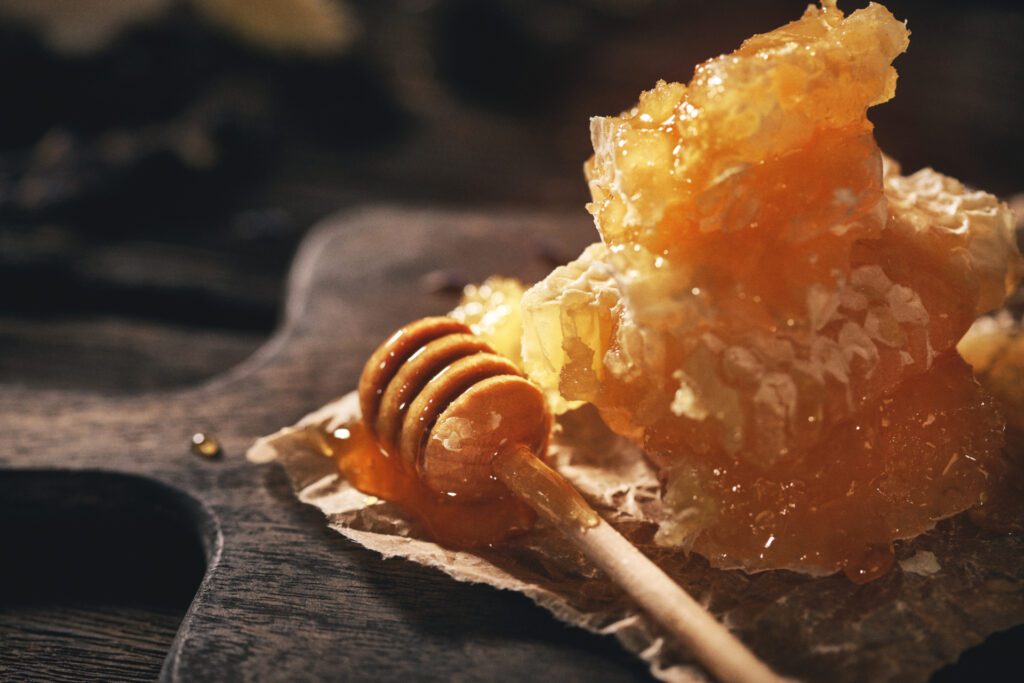Bee-Haven Honey Company Delivers Raw Taste of Florida
by RYAN MILEJCZAK
Sponsored by Visit Central Florida
Tucked into the trees of North Lakeland, Bee-Haven Honey Company is doing more than bottling honey — it’s capturing the flavor of Florida. The company, which specializes in raw, unprocessed honey, is educating the community and collecting new customers one bottle at a time.
“A lot of commercial packers buy honey from all over, including cheap imported honey, blend it to get the color and aroma they want, pasteurize it, and hyper-filter it,” explains Tammy Sadler, who runs Lakeland’s Bee-Haven Honey Company along with her husband, Mike, and her son, Clay. Her son Colby runs Sadler Honey Farm in Ruskin.
This supermarket honey loses significant flavor and quality during this process, and even worse, it’s often adulterated with things like corn syrup and fillers. Bee Haven’s honey, on the other hand, goes from hive to jar with minimal handling.
“We specialize in Florida varietal honey; that’s our thing,” Tammy explains. “All of our honey is made exclusively in Florida, and it’s still raw. That means the honey isn’t pasteurized and has only been rough strained to get the big stuff out, but no pollen is filtered out.”
Bee Haven produces multiple varietal honeys, meaning honey produced from nectar drawn from a specific type of flower. Most Floridians are likely familiar with the bright floral notes of orange blossom honey, which Bee Haven produces along with gallberry honey and other seasonal varieties. Currently, they have tupelo, Brazilian pepper, and palmetto honey, as well as three varieties of flavored creamed honeys (cinnamon, strawberry, and elderberry).
Bee Haven first got its start in the 1970s.
“My father started keeping bees in the early 1970s with his brother under the name SS and Sons,” Mike Sadler explains. “My father passed away in 2003, and we took over and changed the name and officially incorporated the business.”
While Mike’s father focused solely on honey production, that’s only part of Bee Haven’s business.
“We make and sell honey, but we also rent our beehives out to farms here in Florida and elsewhere for pollination,” he explains.
Most of Bee Haven’s hives are currently in North Florida between Lake City and Jacksonville, but they can be found all over the state, as well as across the country.
“In America it’s really the pollen that matters because around two-thirds of what we eat has to be pollinated,” says Mike. “We’ve sent bees to Maine to pollinate blueberries, to Wisconsin to pollinate cherries. There’s such a shortage of bees in the country, and they need them everywhere.”
While Mike and a crew of workers handle the pollination side, Tammy and Clay run the honey side of things, bottling honey and filling online orders. At their Lakeland location, visitors can find a small farm store where they sell their products, including items not available on the website.
“At our North Lakeland location, we primarily sell honey, but we also have other farm- and bee-related products like tallow, skincare, goat’s milk, soap, and items with honey or beeswax as ingredients,” Tammy explains.
One of the most popular products Bee Haven offers is their “allergy blend” honey.
“The science isn’t settled on if it works, but we get people all day long saying, ‘My doctor told me to find local honey for my allergies.’ So for our allergy blend honey, we take a mix of all the honey we make in Florida throughout the year. This provides local pollen in small doses that can help your body build some natural immunity to those allergy triggers in the air,” she says.
She goes on to say they are constantly educating the community about the important role bees play as well as the superiority and benefits of raw honey.
“We can’t walk into a convenience store with a company shirt on without somebody asking about honey,” recounts Tammy. “And it’s just a matter of helping them understand that there really is a significant difference between raw honey and cheap honey that you find at the grocery store. The only way to really know you’re getting good honey is to know your beekeeper.”

